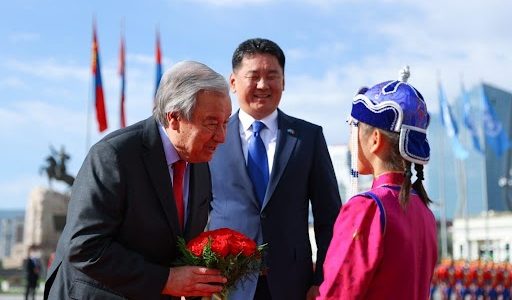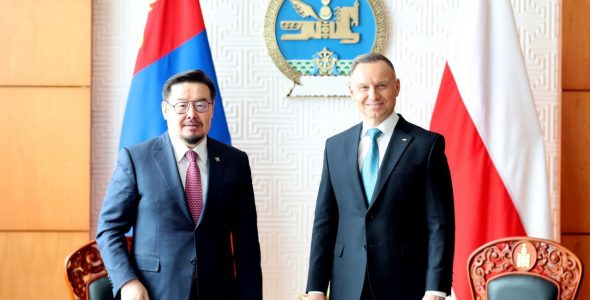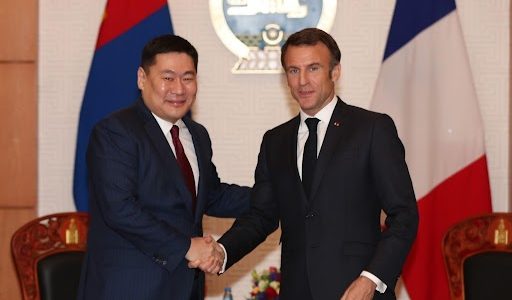Mongolia and international relations

I must admit that foreign relations that were booming in the last three years have seen a minor stoppage /non-political, but technical and logistical/ under the effect of some visible factors, particularly due to the COVID-19 pandemic, the Russia-Ukraine war, and global geopolitical confrontation. Despite this fact, we have kept pursuing our peaceful, open, independent, and multi-pillared (pragmatic in terms of theory) foreign policy. The significance is growing even more.
Let me refer to and explain a phrase mentioned by Mrs. Battsetseg, Minister of Foreign Affairs, which is, “The spirit of our foreign policy is to maintain balanced relations”. Balance, first of all, means maintaining a balanced relationship with our two neighboring forces. Fortunately, we are becoming better at maintaining this balance. For Mongolia, balance also means retaining the balance between our two direct neighbors and third neighbors. We also have managed to do that. If we plot our external measures on a Cartesian coordinate system divided into three axes, we’ll clearly see that this balance has been well kept, the minister said. We can mention here a number of examples. But just take a look at the number of high-level visits done in 2022 and 2023. We managed to successfully implement visits from all required states and in the necessary spheres at a satisfactory level. We managed to maintain the balance in multiple directions, including our two neighboring forces, third neighbors, and the international community. Visits have become more two-directional, dominated by inbound visits, which is a good achievement.
Regarding the frequency of visits, Minister Battsetseg delivered an interesting comparison. Compared to maybe 2-3 high-level visits implemented annually over the past 30 years of democracy, in 2022 alone, Mongolia hosted over 10 high-level visits, including those by six ministers of foreign affairs from both our two direct neighbors and third neighbors. The first half of 2023 earns even more praise. In particular, the Secretary-General of the Shanghai Cooperation Organization, the Under Secretary of State of the United States, the Foreign Minister of Kyrgyzstan, and the Holy See’s Secretary for Relations with States all visited our country.
For Mongolia, balance also means retaining the balance between our two direct neighbors and third neighbors
At the highest level, the President of Mongolia U.Khurelsukh attended the 22nd annual summit of Heads of State of the Shanghai Cooperation Organisation in 2022 (Samarkand, Uzbekistan), the 77th Session of the United Nations General Assembly, the Climate Change Conference (Sharm El-Sheikh, Egypt), paid state visits to the People’s Republic of China and Japan and attended the coronation ceremony of King Charles III of the United Kingdom of Great Britain and Northern Ireland (London).
Zandanshatar Gombojav, Chairman and speaker of the State Great Khural (Parliament) of Mongolia, paid visits to Turkey, the Republic of Korea, Japan, and the Russian Federation, while Prime Minister L.Oyun-Erdene visited the People’s Republic of China and attended the opening ceremony of the Beijing 2022 Winter Olympics, visited Singapore, attended the 7th Eastern Economic Forum in Vladivostok, Russia, the state funeral service for her majesty Queen Elizabeth II of the United Kingdom of Great Britain and Northern Ireland in London, the state funeral service for Shinzo Abe in Tokyo, Japan, visited the Federal Republic of Germany and the Republic of Korea, and visited the People’s Republic of China for a second time and attended the Summer Davos Forum.
Regarding inbound high-level visits, the UN General Secretary paid a visit for the first time at the invitation of the President of Mongolia in 2022 and the presidents of Poland and France respectively visited our country in 2023. Also, the chairman of the standing committee of the National People’s Congress of China, the Speaker of the Senate of Canada, and the Speaker of the National Assembly of Hungary visited Ulaanbaatar. Head of the Holy See Pope Francis is scheduled to visit Mongolia later this year.

All these visits have made significant contributions to the foreign relations of Mongolia and the most important and far-reaching one is the following event. Representatives from more than twenty different countries from across the world are coming to the first-ever Female Foreign Ministers’ Meeting, set to take place in Ulaanbaatar with the participation of several female foreign ministers. An informal gathering of female foreign ministers from all around the world had functioned on the sidelines of the UN General Assembly and Munich Conferences and this informal gathering has now become a formal forum institution, which is about to hold its first meeting in Ulaanbaatar under the auspices of the President of Mongolia. This event is truly historical as part of the foreign policy of the Mongolian State. Feminist foreign policy is being formalized for the first time in Asia, and in particular in Mongolia. 
Regarding the visit by the UN Secretary-General, 2022 and 2023 will be recorded as the years of extremely intensive, multi-pillared policy carried out within the framework of “Mongolia and the United Nations”. Top dignitaries of the United Nations and the UNESCO Director-General came to Mongolia one after another, Ulaanbaatar was the host of the first-ever international conference of female peacekeepers held under the auspices of the United Nations, which has noticeably raised Mongolia’s reputation on the world
stage.
As underlined by the Foreign Minister, the spirit of our foreign policy is a balanced relationship, which is a pillar of our national security, and another pillar is multilateral cooperation. The UN Secretary-General typified Mongolia as “a beacon of peace in a troubled world”, which means our contributions to the UN activities and its peace-keeping efforts are highly appreciated around the world.
Khurelsukh Ukhnaa, President of Mongolia, addressed the general debate of the 77th Session of the United Nations General Assembly, offering a comprehensive answer to what position Mongolia takes regarding every global matter. Mongolia re-affirmed its steadfast pursuit of a peace-loving, open, independent and multi-pillared foreign policy and its confidence in further pursuing such a policy is worthy to be noted here. His address delivered to the rest of the world will be a clear understanding of Mongolia’s position on numerous issues from the nuclear-free world, Mongolia’s nuclear-weapon-free status, the North-East Asia dialogue mechanism and UN peace-keeping operations to natural disasters, communicable diseases, global climate change, biodiversity loss, desertification, land degradation, shortages of safe water resources and droughts and the “Billion Trees” national movement.
Out of the 193 UN member-states, Mongolia is a small one in terms of population and economic opportunities. Nevertheless, such a small country has taken such a big peace initiative and lived up to its commitment, which is a great achievement for the country’s foreign policy and a big step in promoting the country to the outside world.
These numerous visits of bilateral relations are awaiting their fruition. The Mongolian government conducts its foreign policy in an orderly and purposeful manner, creating a favorable foreign environment, opening many new opportunities for cooperation, and confirming this with legal documents of bilateral relations. Strategic and comprehensive partnerships are being taken to a whole new level. Actions are also being taken to increase strategic partners. Currently, there are six states that have such a status, including Russia and China, which are comprehensive strategic partners, Japan, which recently upgraded its status to special strategic partner, as well as the United States, India and the Republic of Korea. The addition of France will be a historical step towards bolstering foreign relations in 2023.
Under the current troublesome and challenging circumstances of international relations, I would like th
e prime target of Mongolia’s society and public, particularly business and economic communities, to preserve and effectively utilize the external relations achieved so far for further development and progress of their home country amidst this threat of a new Cold War-like divide.
May the Mongolian State steadfastly pursue its foreign policy for the implementation of provisions of the historical document known as the “UN Sustainable Development Goals-2030” in line with Mongolia’s priority areas of development, including long-term development policies like “Sustainable Development 2030” and “Vision 2050”!
D. Bayarkhuu, International Relations Research Professor & Ambassador
From Mongolia Economic Forum-2023 special edition